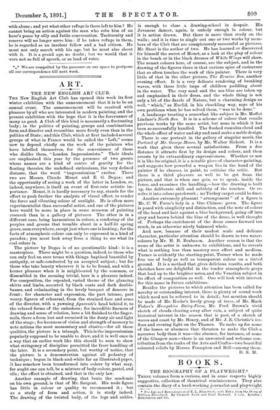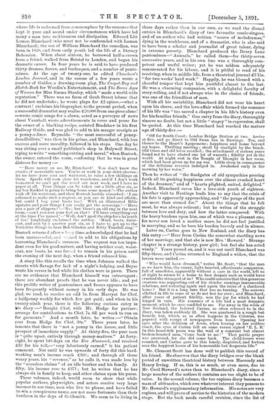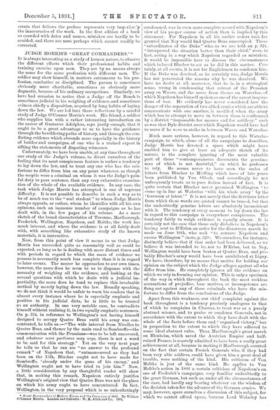BOOKS.
THE BIOGRAPHY OF A PLAYWRIGHT.* THESE volumes form a curious, and in some respects highly suggestive, collection of theatrical reminiscences. They also contain the diary of a bard-working journalist and playwright • The Life and Reminiscences of E. L. Blanchard ; with Notes from the Di iry of William Blanchard. By Clement Scott and Cecil Howard. i vols. London Hutchinson and Co.
whose life is redeemed from commonplace by the romance that kept it pure and sound under circumstances which have led many a man into recklessness and dissipation. Edward Litt Leman Blanchard (who must not be confounded with Laman Blanchard), the son of William Blanchard the comedian, was born in 1820, and from Early youth led the life of a literary Bohemian. When about sixteen, he borrowed half-a-crown from a friend, walked from Bristol to London, and began his dramatic career. In four years he is said to have produced thirty dramas, farces, and burlesques, and a number of panto- mimes. At the age of twenty-one, he edited Chambers's London Journal, and in the course of a few years wrote a number of Guides, a drawing-room play, The Carpet-Bag and Sketch-Book for Woodin's Entertainment, and The Seven Ages of Woman for Miss Emma Stanley, which " made a world-wide reputation." There was no form of Grub Street labour that he did not undertake ; he wrote plays for £2 apiece,—what a contrast ! exclaims his biographer, to the present period, when a successful dramatist may realise £20,000 from one piece alone!
—wrote comic songs for a clown, acted as a purveyor of news about Vauxhall, wrote advertisements in verse and prose for the owner of a blacking recipe, assisted Bradshaw in his first Railway Guide, and was glad to add to his meagre receipts as a penny-a-liner. Reynolds, " the most successful of penny- dreadfullists," was then in his prime, and Blanchard, with less success and more morality, followed in his steps. One day he was sitting over a small publisher's shop in Holywell Street, trying to write " something cutting and moral," when Bostock, the owner, entered the room, confessing that he was in great distress for money :—
" Have mercy on me, Mr. Blanchard! You don't know the straits of mercantile men. You're at work in your shirt-sleeves ; let me have your coat and waistcoat, to raise a few shillings on them. Sparks will soon close his warehouse, and if I don't work to-morrow we can't get the novel out next week, and I have no paper at all. Your things can he taken out a little after six, as my boy Ezekiel is going to bring home some money.'—The author took off his waistcoat, and then Bostock hastily remarked I am ashamed to make such a request, as you are so kind and affable, but could I beg your boots too? With an illustrated Bible upstairs and your things I can easily get the sovereign.'—' Have you a pair of slippers ?'—`No ; but there's an old rug in the next room,—can't you rest your feet on that 1' I'll have everything out at the time I've named.'—' Well, don't spoil the ship for a ha'porth of tar,' laughingly exclaimed the author. Mind, boots, waist- coat, and coat by a quarter past six, as I have to get up to the Yorkshire Stingo to hear Bob Glindon and Kitty Tunsfall sing.'" Bostock returned after a long time, acknowledged that he bad
been unsuccessful, and wished to add to his obligations by borrowing Blanchard's trousers. The request was too impu- dent even for his good-nature, and having neither coat, waist- coat, nor boots, he was forced to remain in his prison until the evening of the next day, when a friend released him.
A story like this recalls the time when Johnson walked the streets with Savage for lack of a night's lodging, and Boyse wrote his verses in bed while his clothes were in pawn. There are no evidences that Blanchard himself was extravagant ; there are abundant proofs that he was never idle ; and yet this prolific writer of pantomimes and farces appears to have been frequently without money in his early days. He was glad, we read, to receive an odd 5s. from Marryat for Chat, a halfpenny weekly for which few got paid; and when in his twenty-ninth year, there is the following curious entry in kis diary :—" Bought Chat, with Mr. Hodge for partner ; arrange for contributions to Chat, 7s. 6d. per week to run on for garments." And a month later, he writes :—" Obtain coat from Hodge for Chat, 30s." Three years later, he laments that there is " not a penny in the house, and little prospect of immediate supply." At thirty-five, the poor man is "quite upset, entirely through money-matters." At forty- eight, he spent 140 days on the Era Almanack, and received £30 for his toil,—" very laboriously earned," is his patient comment. Not until he was upwards of forty did this hard- working man's income reach £300 ; and through all those weary years, his " revenue," as he calls it, was made less by the "ceaseless claims" of an idle brother and his family. At fifty, his income rose to £371; but he writes that he has always six in family to keep, and other claims upon his purse. These volumes, indeed, would seem to show that while popular authors, playwrights, and actors receive very large incomes in our time, men who live to please, and have failed to win a conspicuous name, are not more fortunate than their brethren in the days of Goldsmith. We seem to be living in those days rather than in our own, as we read the dismal entries in Blanchard's diary of two favourite comic-singers, and of an author who had written " scores of melodramas," dying in the workhouse, and of a dramatist, who is also said to have been a scholar and journalist of great talent, dying in extreme poverty. Blanchard produced the Drury Lane pantomimes—" Annuals," he called them—for thirty-seven successive years, and in his own line was a thoroughly com- petent and useful writer; yet he was seldom adequately remunerated for his labour, and it is pitiful to read of his receiving, when in middle life, from a theatrical journal £315s. " for two weeks' hard work." Happily, he was blessed with a cheerful temper that kept him youthful almost to the last._ He was a charming companion, with a delightful faculty of story-telling, and if not always wise in the choice of friends, was one of the friendliest of men.
With all his sociability, Blanchard did not wear his heart upon his sleeve, and the love-affair which formed the romance of his life was " too sacred a chapter in his life's history even for his familiar friends." One entry from the diary, thoroughly sincere no doubt, but not a little " stagey" in expression, shall be quoted. At this time Blanchard had reached the mature age of thirty-five :—
" Off for South Coast ; London Bridge Station at two. Arrive at five, and go direct to Old Swan Inn in Hastings. Tea, and thence to the Heart's Agapemone ; happiness and home beyond my hopes. Thrilling meeting ; stroll by starlight by the beach. Old times and old loves recalled ; the attachment of sixteen years found not to have abated one jot of warmth ; fidelity yet in the world. At night rest in the Temple of Thought in her room, which had been given up for my use. Little sleep in consequence of the delicious reveries indulged in. Awakened early in the morning by her voice."
Then he writes of "the floodgates of old sympathies pouring forth all its gushing happiness over the almost crushed heart of the dreamer," and of " hearts plighted, united, delighted." Indeed, Blanchard raves like a love-sick youth of eighteen- Another visit to Hastings leads him to say that the crisis of his fate is apparently approaching, and " the pangs of•the past are more than atoned for." About the things that he felt most, he was always reticent; but he writes of the struggle between love and duty, and how the latter conquered: With the heavy burdens upon him, one of which was a pleasant one, for never son loved a mother more, he did not feel justified in marrying, and so he bore his burden bravely and in silence.
Later on, Carina goes to New Zealand, and the diary has this entry :—" Hear from Carina the somewhat startling news of her marriage, and that she is now Mrs. Howard.' Strange- chapter in a strange history, poor girl; but feel she has acted wisely." Years passed on, and it was not until Blanchard was fifty-three, and Carina returned to England a widow, that the lovers were united :-
" Who would have dreamed," writes Mr. Scott, "that the man as we knew him, the sunny, light-hearted, affectionate companion, full of anecdotes, apparently without a care in the world, left us at night to return to a home to face despair such as would have crushed the strongest of us ? Who could conceive that this generous- creature was supporting out of his slender earnings innumerable relations, and restoring again and again the ruins of a shattered home ? But it is a long lane that has no turning. The sorrows- allotted in life to some of us do not last for ever ; and Blanchard,. after years of patient fidelity, won the joy for which he had longed in vain. His romance of a life had a most dramatic moment, which he once confided to me. Far away in the wilds of New Zealand, the beloved Carina, so often referred to in the diary, was taken suddenly ill. She was quartered in a rough but homely hut, which, as so often happens in the Colonies, was papered with scraps of newspapers from home. Opening her eyes after the delirium of fever, when tossing on her restless couch, the eyes of Carina fell on some verses signed E. L. B.' In this heart-felt poem was the wail of a constant but almost broken-hearted man, Come back to me ! ' That poetic prayer was answered, for she did come back. The child-lovers were reunited, and Carina gave to this lonely, dispirited, and forlorn man the happiest hours of his honourable but desperate life."
Mr. Clement Scott has done well to publish this record of his friend. He observes that the diary bridges over the blank period of unwritten theatrical history between Macready and Henry Irving. If so, this is as much, or even more, due to- Mr. Cecil Howard's notes than to Blanchard's diary, since a large number of the notices it contains are too slight to be of value. In the second volume, the too copious diary becomes a mass of obituaries, which owe whatever interest they possess to Mr. Howard's supplementary information. His notes are very copious, and will prove of service to the historian of the modern stage. But the book needs careful revision, since the list of errata that follows the preface represents very impfractly the inaccuracies of the work. In the first edition of a book so crowded with dates and names, mistakes are hardly to be avoided, and there are none perhaps which cannot readily be corrected.




















































 Previous page
Previous page